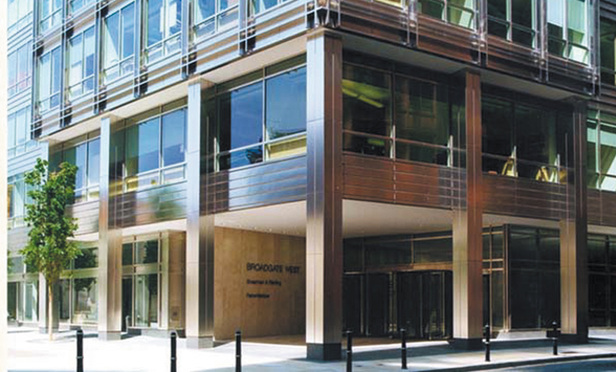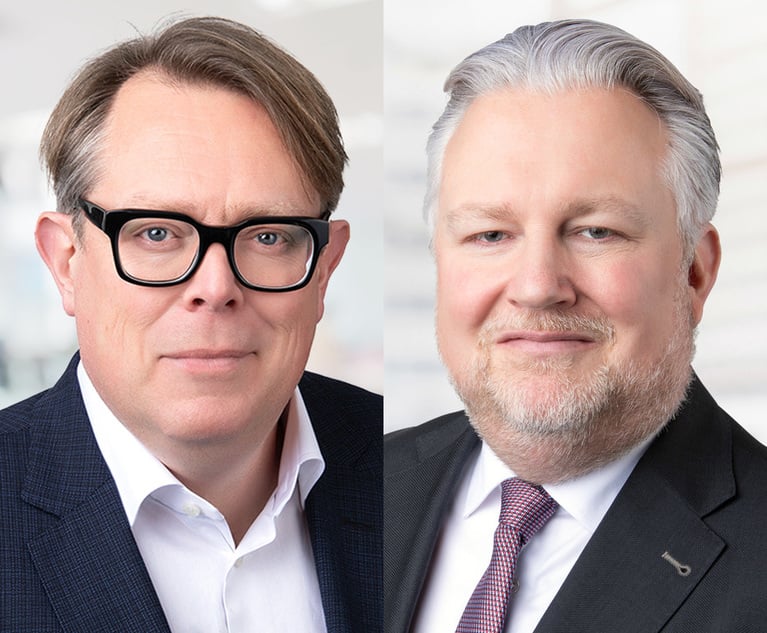Shearman & Sterling private equity head Soundy resigns from firm
US firm's global private equity head quits in double partner exit
October 03, 2016 at 07:03 AM
3 minute read
 Shearman & Sterling global private equity head Mark Soundy has left the firm, along with finance partner Arnaud Fromion in Paris.
Shearman & Sterling global private equity head Mark Soundy has left the firm, along with finance partner Arnaud Fromion in Paris.
The US firm confirmed that Soundy resigned last week. His next move is not yet known.
He has been a partner in the firm's M&A group since 2013, when he joined from Weil Gotshal & Manges. His practice focuses on UK and international M&A work, particularly private equity and complex restructuring work.
Meanwhile, Fromion has been a partner in Shearman's Paris office since 2011 after spending six years as a partner at Linklaters. It is understood that he is leaving to join Goodwin Procter in the French capital. He is expected to bring around two associates with him, but the details are not yet confirmed.
The departures follow Shearman's recent partnership restructuring. Earlier this month, it internally announced plans to introduce a second non-equity tier to the partnership.
In a firm-wide email, first published by Above the Law on 23 September, Shearman said it would "consolidate" its practice groups "to create a more efficient practice group and management structure". It added details about the new practice structure will be announced "in due course".
It is understood that the new tier is only applicable for associates being promoted to salaried partners and that no equity or fixed-share partners can be demoted to this rank. Instead, the firm is looking at shifting some equity partners to the fixed-share level.
However, the requirement for a supermajority of 75% of equity partners to approve a partner's removal from the equity partnership remains intact, Legal Week understands. In the past, this has thwarted Shearman's leaders attempts to trim the ranks of unproductive partners.
The 839-lawyer firm had 162 equity partners and 26 fixed-share partners last year.
In the past, Shearman's leaders had attempted to trim the ranks of unproductive partners but were hamstrung by the partnership agreement, which requires a supermajority of 75% of equity partners to approve a partner's removal from the equity partnership.
Meanwhile, the firm has continued to grow its younger tier of partners. It has promoted 25 partners within the past two years, many to fixed-share status.
Partners have grown frustrated at the firm's stalled growth. After two strong years in 2013 and 2014, average profits per equity partner fell nearly 4% in 2015, to $1.8m, while gross revenues grew by slightly less than 2% last year, to $860.5m.
NOT FOR REPRINT
© 2025 ALM Global, LLC, All Rights Reserved. Request academic re-use from www.copyright.com. All other uses, submit a request to [email protected]. For more information visit Asset & Logo Licensing.
You Might Like
View All
German Court Orders X to Release Data Amid Election Interference Concerns

De Brauw Partner Departs for In-House Role with Swiss Family Enterprise

Hengeler Advises On €7B Baltica 2 Wind Farm Deal Between Ørsted and PGE
2 minute read
Trending Stories
- 1States Accuse Trump of Thwarting Court's Funding Restoration Order
- 2Microsoft Becomes Latest Tech Company to Face Claims of Stealing Marketing Commissions From Influencers
- 3Coral Gables Attorney Busted for Stalking Lawyer
- 4Trump's DOJ Delays Releasing Jan. 6 FBI Agents List Under Consent Order
- 5Securities Report Says That 2024 Settlements Passed a Total of $5.2B
Who Got The Work
J. Brugh Lower of Gibbons has entered an appearance for industrial equipment supplier Devco Corporation in a pending trademark infringement lawsuit. The suit, accusing the defendant of selling knock-off Graco products, was filed Dec. 18 in New Jersey District Court by Rivkin Radler on behalf of Graco Inc. and Graco Minnesota. The case, assigned to U.S. District Judge Zahid N. Quraishi, is 3:24-cv-11294, Graco Inc. et al v. Devco Corporation.
Who Got The Work
Rebecca Maller-Stein and Kent A. Yalowitz of Arnold & Porter Kaye Scholer have entered their appearances for Hanaco Venture Capital and its executives, Lior Prosor and David Frankel, in a pending securities lawsuit. The action, filed on Dec. 24 in New York Southern District Court by Zell, Aron & Co. on behalf of Goldeneye Advisors, accuses the defendants of negligently and fraudulently managing the plaintiff's $1 million investment. The case, assigned to U.S. District Judge Vernon S. Broderick, is 1:24-cv-09918, Goldeneye Advisors, LLC v. Hanaco Venture Capital, Ltd. et al.
Who Got The Work
Attorneys from A&O Shearman has stepped in as defense counsel for Toronto-Dominion Bank and other defendants in a pending securities class action. The suit, filed Dec. 11 in New York Southern District Court by Bleichmar Fonti & Auld, accuses the defendants of concealing the bank's 'pervasive' deficiencies in regards to its compliance with the Bank Secrecy Act and the quality of its anti-money laundering controls. The case, assigned to U.S. District Judge Arun Subramanian, is 1:24-cv-09445, Gonzalez v. The Toronto-Dominion Bank et al.
Who Got The Work
Crown Castle International, a Pennsylvania company providing shared communications infrastructure, has turned to Luke D. Wolf of Gordon Rees Scully Mansukhani to fend off a pending breach-of-contract lawsuit. The court action, filed Nov. 25 in Michigan Eastern District Court by Hooper Hathaway PC on behalf of The Town Residences LLC, accuses Crown Castle of failing to transfer approximately $30,000 in utility payments from T-Mobile in breach of a roof-top lease and assignment agreement. The case, assigned to U.S. District Judge Susan K. Declercq, is 2:24-cv-13131, The Town Residences LLC v. T-Mobile US, Inc. et al.
Who Got The Work
Wilfred P. Coronato and Daniel M. Schwartz of McCarter & English have stepped in as defense counsel to Electrolux Home Products Inc. in a pending product liability lawsuit. The court action, filed Nov. 26 in New York Eastern District Court by Poulos Lopiccolo PC and Nagel Rice LLP on behalf of David Stern, alleges that the defendant's refrigerators’ drawers and shelving repeatedly break and fall apart within months after purchase. The case, assigned to U.S. District Judge Joan M. Azrack, is 2:24-cv-08204, Stern v. Electrolux Home Products, Inc.
Featured Firms
Law Offices of Gary Martin Hays & Associates, P.C.
(470) 294-1674
Law Offices of Mark E. Salomone
(857) 444-6468
Smith & Hassler
(713) 739-1250








